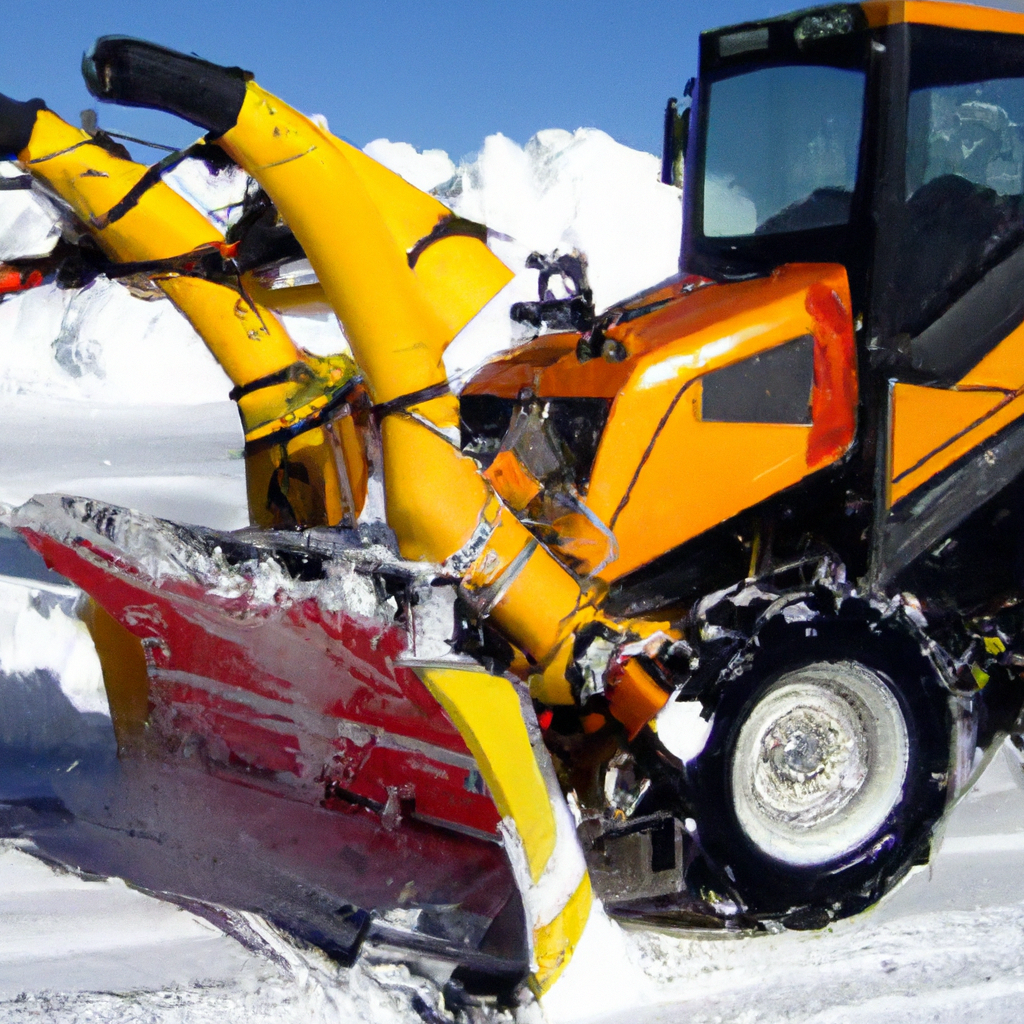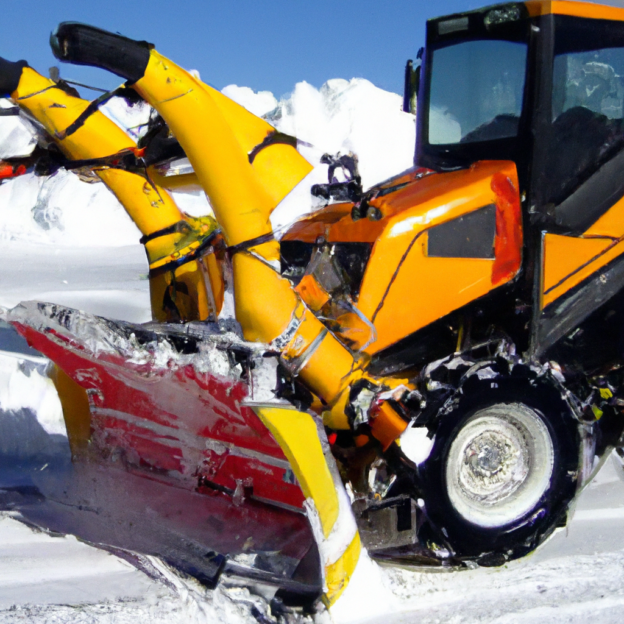So you’ve got your trusty snowblower, ready to tackle the snow-covered driveway and sidewalks. But have you ever wondered if you’re using the right fuel? In the article “Is Ethanol-free Fuel Better For Snowblowers?”, we’ll delve into the question of whether using ethanol-free fuel can make a difference in the performance and maintenance of your snowblower.

Overview of Ethanol Fuel
What is ethanol?
Ethanol is a type of alcohol that is derived from crops such as corn, sugarcane, or wheat. It is most commonly used as a fuel additive in gasoline to reduce emissions and increase octane levels.
Ethanol as a fuel additive
When ethanol is blended with gasoline, it helps to increase the oxygen content of the fuel, which leads to a more complete combustion process. This results in reduced emissions of harmful pollutants, such as carbon monoxide and certain volatile organic compounds.
Effects of ethanol on small engines
While ethanol can offer benefits as a fuel additive in terms of reducing emissions, it can also pose certain challenges for small engines, such as those found in snowblowers. The high alcohol content of ethanol can cause issues with engine performance and durability, as well as lead to increased maintenance and repair costs.
Problems Caused by Ethanol Fuel
Ethanol and snowblower performance
Ethanol can negatively impact the performance of snowblowers in several ways. The high alcohol content in ethanol-blended fuel can make it more difficult to start the engine, especially in cold weather conditions. It can also lead to reduced power and efficiency, resulting in a decrease in snowblowing performance.
Ethanol-related damage to snowblower components
One of the major concerns with using ethanol fuel in snowblowers is the potential damage it can cause to various engine components. Ethanol has a solvent-like effect that can deteriorate rubber and plastic parts over time. This can lead to leaks, clogs, and other issues, requiring costly repairs or replacements.
Ethanol-induced corrosion
Ethanol has hygroscopic properties, meaning it can absorb moisture from the surrounding air. When this moisture is absorbed by the fuel, it can lead to the formation of water in the fuel system. This water can cause corrosion in metal components such as fuel tanks, carburetors, and fuel lines, further exacerbating the potential for engine damage.
Ethanol’s impact on fuel system components
The alcohol content in ethanol fuel can also have detrimental effects on fuel system components. It can cause rubber gaskets and seals to deteriorate, resulting in fuel leaks and decreased performance. Additionally, ethanol-blended fuel can lead to the formation of deposits and varnish in the fuel system, affecting fuel flow and overall engine performance.
Benefits of Ethanol-Free Fuel for Snowblowers
Improved snowblower performance
Using ethanol-free fuel in snowblowers can help to improve their overall performance. Ethanol-free fuel is less likely to cause starting issues, especially in cold temperatures. It can also provide better power and efficiency, allowing snowblowers to effectively clear snow without any performance-related obstacles.
Reduced maintenance and repairs
By using ethanol-free fuel, snowblower owners can potentially reduce the frequency of maintenance and repairs. Without the detrimental effects of ethanol, engine components are less likely to deteriorate, leading to fewer leaks, clogs, and other issues. This can result in cost savings and less downtime for snowblower owners.
Decreased likelihood of fuel system issues
Ethanol-free fuel eliminates the risk of ethanol-induced corrosion and damage to fuel system components. By avoiding the moisture absorption and corrosive nature of ethanol, snowblower owners can prevent the formation of rust and other forms of damage in the fuel system. This helps to maintain optimal fuel flow and prolong the lifespan of the engine.
Prevention of corrosion and component damage
One of the key advantages of using ethanol-free fuel in snowblowers is the prevention of corrosion and damage to engine components. The absence of ethanol eliminates the solvent-like effect that can deteriorate rubber and plastic parts. Snowblower owners can therefore avoid costly repairs or replacements to various engine components due to ethanol-related damage.

Using Ethanol-Free Fuel in Snowblowers
Finding ethanol-free fuel
To use ethanol-free fuel in snowblowers, it is essential to find fuel stations or suppliers that offer this specific option. While ethanol-free fuel may not be as widely available as ethanol-blended fuel, it can still be found in certain areas. Local fuel stations, marinas, or small engine repair shops may be good places to start when looking for ethanol-free fuel.
Identifying ethanol-free fuel options
When looking for ethanol-free fuel, it is important to read labels carefully to determine the ethanol content. Look for labels that explicitly state “ethanol-free” or “0% ethanol.” It is also crucial to check if the fuel is specifically formulated for small engines, as this ensures optimal performance and protection.
Understanding fuel labeling
Fuel labeling can vary between manufacturers and regions, making it essential to understand the different terms used. Labels such as E10, E15, or E85 indicate the percentage of ethanol in the fuel. To ensure ethanol-free fuel, carefully check the label for the absence of any ethanol percentage.
Alternative fuel options for snowblowers
If ethanol-free fuel is not readily available, there are alternative fuel options that snowblower owners can consider. These include using premium gasoline with the lowest ethanol content available, using a fuel stabilizer to mitigate the effects of ethanol, or utilizing specially formulated small engine fuel that is designed to minimize ethanol-related issues.
Ethanol-Free Fuel vs. Ethanol-Blended Fuel
Differences in constituents
The main difference between ethanol-free fuel and ethanol-blended fuel lies in the presence or absence of ethanol. Ethanol-free fuel contains no ethanol, while ethanol-blended fuel can have varying percentages of ethanol, typically up to 10% (E10). This difference in constituents can significantly impact the performance and durability of snowblower engines.
Performance comparison
When comparing performance, ethanol-free fuel tends to outperform ethanol-blended fuel in snowblowers. The absence of ethanol eliminates starting issues, increases power and efficiency, and reduces the likelihood of engine damage. Ethanol-blended fuel, on the other hand, can lead to reduced performance, starting difficulties, and increased maintenance requirements.
Long-term effects on snowblower engines
Using ethanol-free fuel can have long-term benefits for snowblower engines. By preventing ethanol-related damage, such as corrosion and deterioration of engine components, the lifespan of the engine can be extended. This translates to lower maintenance and repair costs, as well as a longer overall lifespan for the snowblower.
Considerations When Using Ethanol-Free Fuel
Cost of ethanol-free fuel
Ethanol-free fuel often comes at a higher cost compared to ethanol-blended fuel. The limited availability and specialized production requirements of ethanol-free fuel contribute to this price difference. Snowblower owners should weigh the potential benefits against the increased cost when deciding whether to invest in ethanol-free fuel.
Environmental impact
While ethanol-free fuel may provide advantages for snowblower engines, it is important to consider the broader environmental impact. Ethanol-blended fuel is often favored for its potential to reduce greenhouse gas emissions and dependence on fossil fuels. Ethanol-free fuel, however, can offer a more localized environmental benefit by reducing the release of harmful pollutants from snowblower engines.
Availability and accessibility
One of the challenges of using ethanol-free fuel is its limited availability and accessibility. Snowblower owners may need to travel to specific fuel stations or suppliers to obtain ethanol-free fuel, which can be inconvenient and time-consuming. Additionally, certain regions may have stricter regulations on the sale and distribution of ethanol-free fuel, further limiting its accessibility.
Storage and shelf life
Ethanol-free fuel typically has a longer shelf life compared to ethanol-blended fuel. The absence of ethanol means that there is less chance of the fuel absorbing moisture and degrading over time. This longer shelf life can be beneficial for snowblower owners who store fuel for extended periods or use their snowblowers infrequently.
Ethanol-Free Fuel Usage Tips
Proper fuel storage
To maximize the benefits of ethanol-free fuel, it is crucial to store it properly. This involves using approved fuel containers that are specifically designed for storing fuel, ensuring they are tightly sealed to prevent moisture absorption. It is also important to store fuel in a cool, dry location, away from potential sources of heat or ignition.
Fuel system maintenance
Regular maintenance of the snowblower’s fuel system is essential for optimal performance when using ethanol-free fuel. This includes checking and cleaning the fuel tank, replacing fuel filters as recommended by the manufacturer, and inspecting fuel lines for any signs of damage or leaks. Regular maintenance helps to ensure proper fuel flow and prevent any issues with the fuel system.
Periodic fuel system flush
Performing occasional fuel system flushes can help to remove any accumulated deposits or varnish that may hinder fuel flow and engine performance. This involves running a fuel system cleaner through the snowblower’s fuel system to remove any contaminants. Consult the snowblower’s manufacturer guidelines or consult with a professional for guidance on when and how to perform a fuel system flush.
Winter storage considerations
When preparing a snowblower for winter storage, it is important to take ethanol-free fuel into account. Prior to storage, it is recommended to run the snowblower with ethanol-free fuel or add a fuel stabilizer to the tank to prevent any ethanol-related issues during storage. It is also essential to drain any remaining fuel from the tank and fuel lines to avoid potential damage from degraded fuel.
Expert Opinions on Ethanol-Free Fuel
Snowblower manufacturers’ recommendations
Several snowblower manufacturers recommend or specify the use of ethanol-free fuel to maximize engine performance and durability. These recommendations are based on extensive testing and evaluations conducted by the manufacturers themselves. Following these recommendations can help to ensure optimal results and avoid any potential issues caused by ethanol-blended fuel.
Experts’ opinions on ethanol’s impact
Many experts in the small engine industry have expressed concerns about the impact of ethanol on small engines, including those found in snowblowers. They point to the numerous issues that can arise from ethanol-blended fuel, such as starting difficulties, decreased performance, and increased maintenance requirements. Expert opinions often align with the evidence of ethanol-related damage observed in small engine studies.
Research studies on ethanol and small engines
Various research studies have been conducted to examine the effects of ethanol on small engines, including snowblower engines. These studies have consistently found evidence of ethanol-related issues, such as increased corrosion, fuel system damage, and decreased engine performance. The findings from these studies further support the use of ethanol-free fuel to mitigate these potential problems.
Conclusion
In conclusion, while ethanol fuel may offer benefits in terms of reduced emissions and increased octane levels, it can also pose significant challenges for small engines, such as those found in snowblowers. The high alcohol content of ethanol can lead to issues with engine performance, durability, and maintenance requirements. Using ethanol-free fuel in snowblowers can help to improve overall performance, reduce the likelihood of fuel system issues, and prevent corrosion and component damage. Snowblower owners should consider factors such as cost, environmental impact, availability, and storage when deciding whether to opt for ethanol-free fuel. The recommendations of snowblower manufacturers, expert opinions, and research studies all point towards the advantages of ethanol-free fuel for snowblower engines. Proper fuel storage, fuel system maintenance, periodic flushes, and winter storage considerations are vital for maximizing the benefits of ethanol-free fuel. By making informed choices and following best practices, snowblower owners can ensure optimal performance and longevity for their machines.
